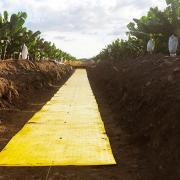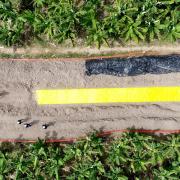New protection mechanism to ensure unauthorized excavations do not contact the pipeline – featuring
 by TC Energy
by TC Energy


Ensuring the integrity of our pipeline assets is one of our main objectives when we talk about our safety as a core value. It becomes a challenge when we must make it real in our 92,600 km (57,500 miles) network of natural gas pipelines. That is why a periodic systematic risk evaluation of our pipelines is essential, as well as finding new solutions that allow us to achieve our “Zero is Real” goal. In this sense, the Mexico Technical Services, through its Pipeline Integrity Team, has been working for several months on the implementation of a new protection mechanism in the Manzanillo – Guadalajara System, in western Mexico. Overpipe is implementing this new mechanicalprotection in areas where we have seen increased population density that result in an increase in the pipeline class rating. This use of HDPE is a much more effective solution to prevent damage from unauthorized activities, such as excavations.”David Foken Technical Services Director These additional safety measures often include mechanical damage hazard mitigation to ensure unauthorized excavations do not contact the pipeline. The Mexico Pipeline Integrity team recently identified an alternative to the traditional use of concrete slabs placed over the pipeline to provide that protection. This new protection mechanism consists of high-density polyethylene (HDPE) slabs with high mechanical strength specially designed to provide a penetration barrier to protect vulnerable underground infrastructure and resist extensive excavations attempts. These plastic slabs are just as efficient as concrete to avoid third-party mechanical, but with additional benefits. Its high visibility colour allows our patrolling team to easily spot any exposed section in the pipeline and quickly reveals the existence of a high-pressure pipeline to any third party performing unauthorized activities over the pipeline. One of the essential characteristics of the new protection system is that it does not interfere with the pipeline’s cathodic protection and allows a balance of the humidity level above and below the slab through several drain holes. Additionally, because of its reduced weight, the HDPE slabs do not sink in swampy areas, avoiding the risk of contact with the pipeline. “Pipeline Integrity employs a life cycle approach to managing the integrity of Mexico pipeline systems; per instance, Class and Damage Prevention programs consider the site-specific hazards, and provide the required reliability for the locations, by identifying preventive and mitigative actions in the most effective manner to maintain a safe operation and integrity of Mexico assets,” said Felipe Radilla, Mexico Pipeline Integrity Manager. Additionally, installation times and costs are significantly less when compared to traditional concrete slabs. The use of heavy lifting equipment is not necessary since two workers can move and install each slab, making them an ideal solution to protect the pipeline in hard to access spots. Since TC Energía approved this new protection standard in 2018, the Mexico Major Projects team has also adopted it for the installation on the Tula-Villa de Reyes gas pipeline, now in its construction phase. “In the Technical Services team, we seek to innovate to always have the best solutions that protect our assets and neighbouring communities. This alternative material is a best practice that can be extended to other assets in our extensive network across North America,” concluded David Foken.
